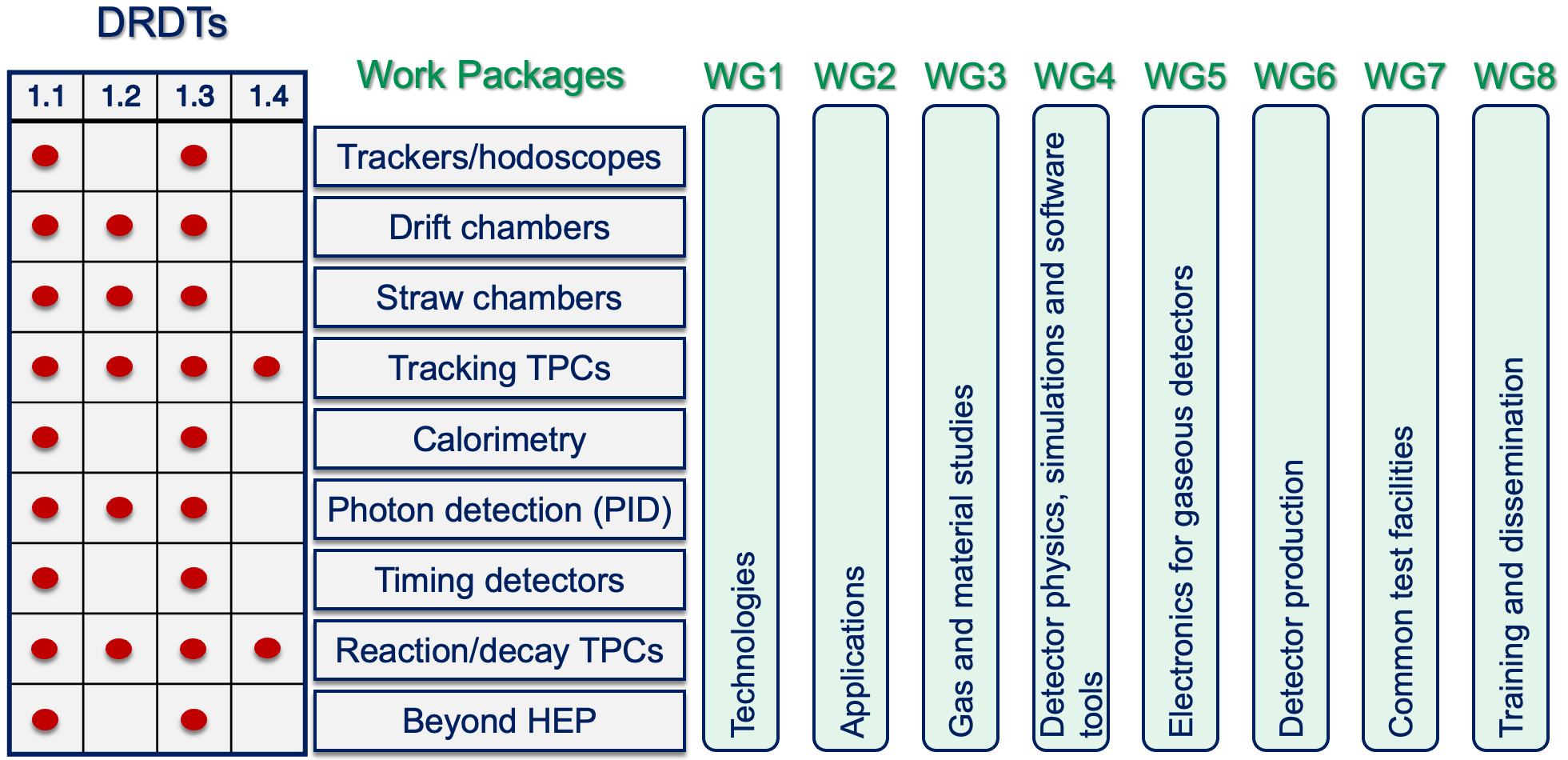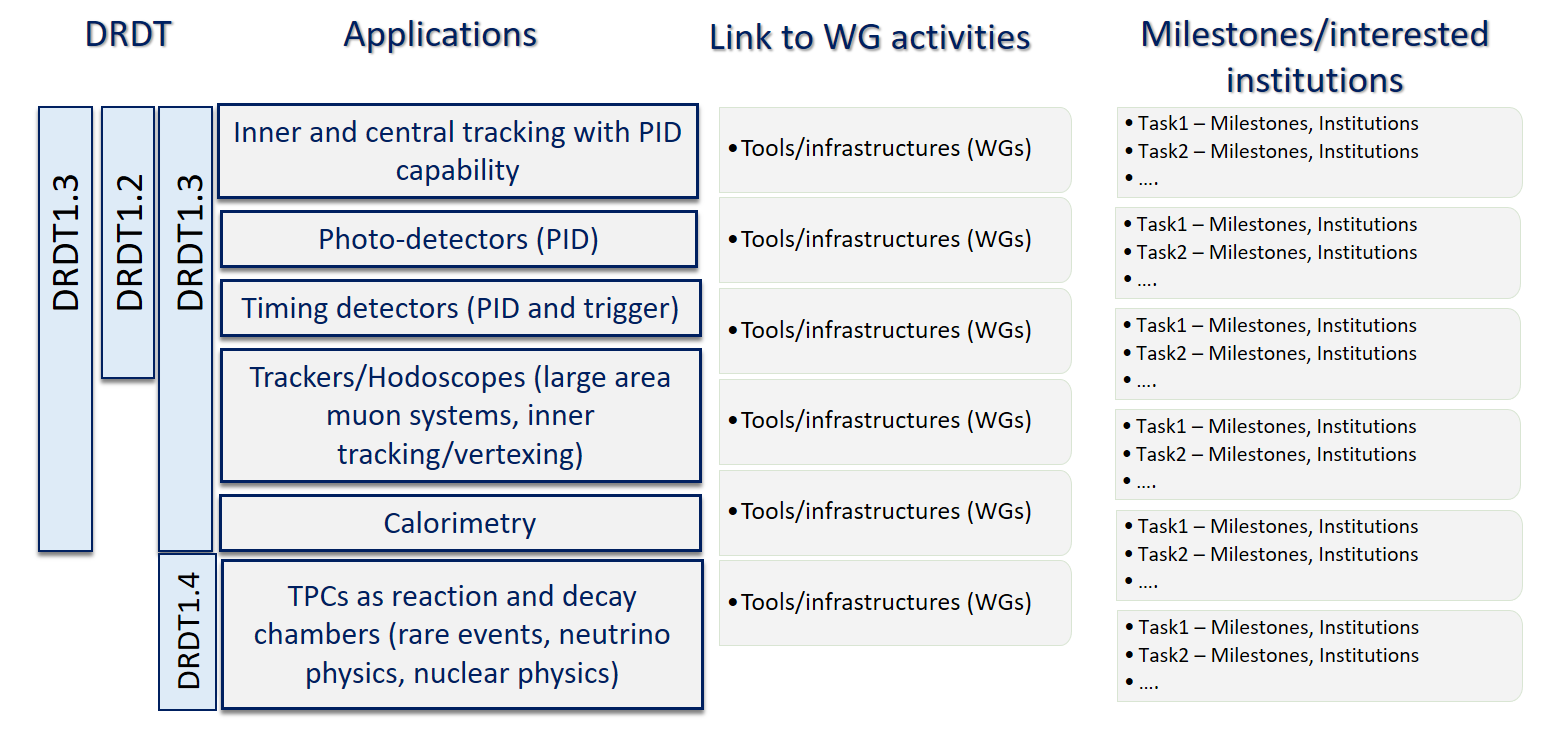The Collaboration will have a scientific organization based on Working Groups (WGs). These WGs will be a scientific reference for the community and will provide a platform for sharing knowledge, expertise, and efforts. They will play a crucial role in identifying, guiding, and supporting strategic detector R&D directions, facilitating the establishment of joint projects between institutes. Two types of joint projects will be implemented: Common Projects (CP) and Work Packages (WP). CPs are short-term projects with limited time and resources, supported by the Collaboration. WPs, on the other hand, encompass long-term projects with significant strategic R&D goals and corresponding funding lines. The following sections will provide a brief description of Working Groups, Common Projects, and Work Packa
ges.
WORKING GROUPS
he Collaboration will be organized into Working Groups (WGs), serving as the backbone of the proposed R&D environment and framework. WGs will support the development of novel technologies and the consolidation of existing ones. They will facilitate the exchange of ideas and foster synergies between institutes. serving as a knowledge and technology hub. Additionally, they will be recognized as a scientific reference for the community.
The proposed WGs are as follows:
- WG1: Technological Aspects and Developments of New Detector Structures, Common Characterization and Physics Issues
- WG2: Applications
- WG3: Gas and Material Studies, and link to Novel Technologies
- WG4: Detector Physics, Modelling and Simulation frameworks
- WG5: Electronics for Gaseous Detectors
- WG6: Production and Technology Transfer
- WG7: Common Test Facilities and Infrastructures
- WG8: Knowledge Transfer, Training and Career
These Working Groups will guide new developments and provide support for the research activities of Collaboration members.

COMMON PROJECTS
Common Projects (CPs) will support "Blue-Sky", generic R&D, and projects that are crucial for the community. These projects promote collaborative efforts involving a minimum number of participating institutes. CPs will be approved and reviewed by the DRD1 management and supported by DRD1 Common Funds, along with matching resources from participating institutes. CPs are limited in duration and financial support. CPs proposed by early-career researchers will be promoted; they will offer an opportunity for these researchers to gain experience in starting and managing small-scale R&D projects and to gain visibility within the Collaboration. Successful Common Projects may evolve into Work Packages.
WORK PACKAGES
Work Packages (WPs) will consolidate the activities of institutes with shared research interests in specific areas, including applications (e.g., TPC, Muon Systems, Calorimetry), challenges (e.g. Precise Timing, High Rate, Longevity), technologies (e.g. Resistive Electrodes, Photocathodes), detector technologies (e.g., MPGDs, RPCs, Wires), and Working Group tasks (e.g., electronics, software). These WPs will actively contribute to the scientific program, R&D environment, infrastructure, and R&D tools within DRD1. Whenever feasible, WPs will integrate activities from the Working Groups (e.g., simulation, electronics). WPs can be initiated at any time and will be internally organized and coordinated by the participating institutes. They will define their scope, deliverables, work plan, and the necessary resources in detail. The participating institutes will have complete control and operational authority over the allocated resources. The implementation of Work Packages in respect with the ECFA themes and in the context of the Collaboration is shown in Fig. reffig:DRD1-WP-Schema To establish the proposed activities and secure the required resources, a formal agreement will be established among the participating institutes, funding agencies, DRD1 management, and the host lab (CERN). Each Work Package Agreement will be included as an annexe in the DRD1 MoU. WPs will report to DRD1 and undergo review by the Detector Research and Development Committee (DRDC). The funding for WPs will be provided to the participating institutes by their respective Funding Agencies through major funding lines aligned with the strategic detector R&D priorities outlined in the ECFA detector R&D roadmap [12]. The involved Funding Agencies will be responsible for approving the WPs and overseeing their progress.
